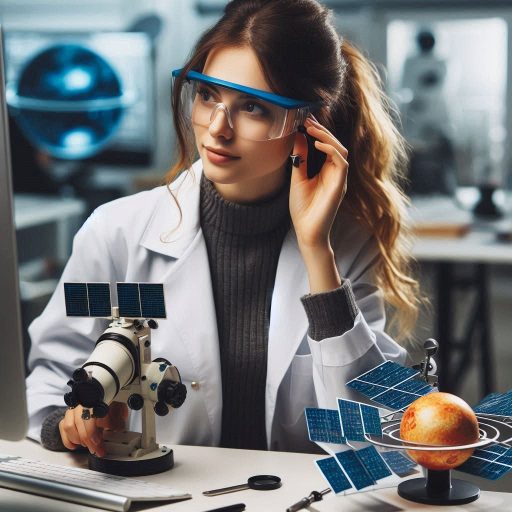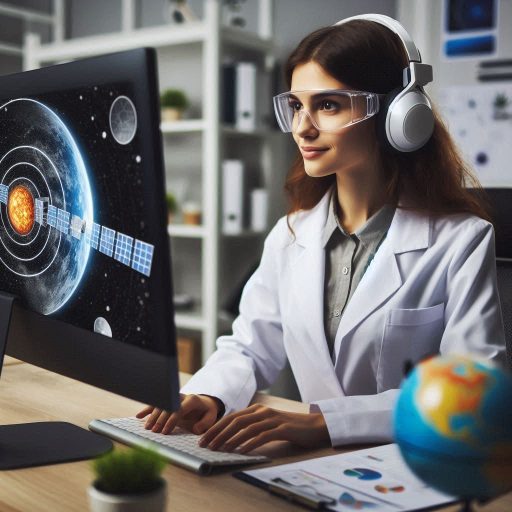Introduction
Space scientists study celestial bodies, cosmic phenomena, and the universe’s fundamental laws.
They analyze data collected from various missions, telescopes, and satellites.
Their work encompasses various fields, including astronomy, planetary science, and astrophysics.
Space scientists formulate hypotheses, conduct experiments, and develop models to explain their findings.
The importance of space scientists lies in their role in exploring the unknown.
They push the boundaries of human knowledge, answering fundamental questions about existence.
By investigating planets, stars, and galaxies, they uncover the secrets of the universe.
Their research enhances our understanding of phenomena such as black holes, dark matter, and the origins of the universe.
Space scientists also contribute to technological advancements that benefit society.
Innovations developed for space exploration often find applications in everyday life, such as satellite technology and imaging systems.
These advancements improve communication, weather forecasting, and even medical imaging.
Additionally, space scientists inspire future generations to pursue careers in STEM fields.
Their discoveries and explorations ignite curiosity and foster interest in science and technology.
Space scientists play a crucial role in expanding our understanding of the cosmos.
Their contributions not only deepen our knowledge but also drive technological progress and inspire new generations of scientists.
Academic Requirements
Bachelor‘s Degree in a Related Field
A bachelor’s degree serves as the first step in a space science career.
Students can choose various majors, such as physics, astronomy, or aerospace engineering.
These programs provide essential knowledge about the principles of the universe and space exploration.
Physics programs teach students about fundamental forces and energy.
Astronomy programs focus on celestial objects and cosmic phenomena.
Aerospace engineering degrees prepare students to design and build spacecraft and satellites.
All these disciplines equip students with the skills necessary for further study.
During their undergraduate studies, students engage in laboratory work and research projects.
This hands-on experience helps students apply theoretical concepts to practical problems.
Additionally, students develop critical thinking and analytical skills vital for scientific inquiry.
Internships during the undergraduate program are beneficial for gaining real-world experience.
Many universities offer partnerships with space agencies and research organizations.
These internships provide students opportunities to work alongside experienced scientists and engineers.
Advanced Degrees for Research Positions
Many space science careers require advanced degrees.
A master’s degree or Ph.D. often opens doors to more specialized roles.
Research positions in academia, government, or industry typically necessitate these higher qualifications.
Master‘s degree programs allow students to focus on specific areas of interest.
For example, students can specialize in planetary science, astrobiology, or astrophysics.
These programs often involve significant research components, allowing students to contribute to ongoing studies.
Ph.D. programs require students to conduct original research.
Completing a dissertation on a relevant topic is a crucial requirement.
This research experience prepares graduates for careers in research and academia.
Graduate students benefit from mentorship opportunities with faculty members.
These relationships help students refine their research interests and gain guidance.
Faculty often have connections in the industry, facilitating job placement after graduation.
Additionally, advanced degrees provide opportunities for networking.
Graduate students attend conferences and workshops, where they can meet established professionals.
These interactions can lead to collaboration and job offers in the future.
Furthermore, specialized training is available during graduate studies.
Students can learn advanced techniques in data analysis, programming, and remote sensing.
Mastering these skills is essential for analyzing data from space missions.
The educational path to becoming a space scientist begins with a relevant bachelor’s degree.
A strong foundation in physics, astronomy, or aerospace engineering is vital.
Pursuing advanced degrees significantly enhances career prospects and research opportunities.
Graduate studies provide students with specialized knowledge and research experience, essential for a successful career in space science.
Engaging in internships and networking during studies helps students build valuable connections.
As space exploration advances, the demand for qualified space scientists will continue to grow.
This educational journey prepares aspiring scientists to contribute significantly to our understanding of the universe and drive future discoveries in space.
Specialized Knowledge and Skills
Understanding of Astrophysics, Planetary Science, and Space Exploration Technology
A deep understanding of astrophysics is crucial for aspiring space scientists.
Astrophysics involves studying the physical properties and behaviors of celestial bodies.
Knowledge in this field helps scientists explain phenomena like black holes and supernovae.
Planetary science also plays a significant role in space exploration.
It focuses on the study of planets, moons, and planetary systems.
Aspiring space scientists must learn about the geological and atmospheric characteristics of celestial bodies.
Space exploration technology encompasses the tools and methods used to explore space.
Familiarity with spacecraft design, satellite systems, and launch vehicles is essential.
Understanding these technologies allows scientists to contribute to mission planning and execution.
Courses in these areas typically include physics, chemistry, and geology.
Students should prioritize classes that offer hands-on laboratory experience.
Practical applications of theoretical concepts are vital for mastering these subjects.
Moreover, participating in research projects enhances understanding.
Collaborating with professors or joining research groups provides valuable experience.
This exposure to real-world applications prepares students for future careers.
Proficiency in Mathematics, Computer Programming, and Data Analysis
Mathematics is a fundamental skill for space scientists.
Proficiency in calculus, statistics, and algebra is essential.
These mathematical concepts are used to analyze data and develop models.
Computer programming is another critical skill.
Space scientists often use programming languages like Python, MATLAB, or C++.
These languages allow them to create simulations and analyze complex datasets.
Data analysis skills are vital for interpreting research findings.
Space scientists must be adept at using software tools for data visualization and statistical analysis.
Proficiency in tools like Excel, R, or specialized software is highly beneficial.
Students should seek courses that integrate mathematics and computer science with scientific applications.
Many universities offer interdisciplinary programs that combine these fields.
Pursuing internships or projects focused on data analysis further enhances these skills.
Additionally, developing problem-solving abilities is crucial.
Space scientists often face complex challenges requiring innovative solutions.
Cultivating analytical thinking and creative problem-solving skills will aid in overcoming obstacles.
Aspiring space scientists need a robust educational background in astrophysics, planetary science, and space exploration technology.
They must also develop proficiency in mathematics, computer programming, and data analysis.
This combination of knowledge and skills is essential for a successful career in space science.
Engaging in research projects and practical experiences will strengthen understanding.
Building a diverse skill set will prepare students for the dynamic challenges of space exploration.
As they pursue their educational paths, future space scientists contribute to our understanding of the universe and inspire the next generation of explorers.
By committing to continuous learning and development, they can make significant contributions to the field of space science.
Read: Top Skills Needed for a Successful Geology Career
Research Experience
Participating in Research Projects or Internships Related to Space Science
Participating in research projects provides invaluable hands-on experience.
Engaging in research allows students to apply theoretical knowledge to real-world problems.
Many universities and institutions offer opportunities to work on space-related projects.
Internships are also vital for gaining practical experience.
They provide exposure to the professional environment of space science.
Many organizations, such as NASA and private space companies, offer internship programs for students.
During internships, students work alongside experienced scientists and engineers.
They learn essential skills and techniques related to space exploration.
Interns may assist in data analysis, equipment testing, or mission planning.
Working on research projects or internships enhances a student’s resume.
Employers often seek candidates with practical experience in their field.
Additionally, these experiences help students build a professional network.
Establishing connections with professionals in the field can open doors.
Networking during internships may lead to job offers or recommendations.
Building relationships with mentors can provide guidance throughout a student’s career.
Publishing Papers or Presenting at Conferences to Demonstrate Expertise
Publishing research papers is an excellent way to showcase expertise.
Aspiring space scientists should aim to contribute to scholarly journals.
Publishing demonstrates a commitment to advancing knowledge in space science.
Research papers should highlight original findings or innovative methodologies.
Collaborating with professors or experienced researchers can strengthen a student’s work.
Co-authoring papers allows students to learn from seasoned professionals while contributing their insights.
Presenting research at conferences is equally important.
Attending conferences provides opportunities to share findings with peers and experts.
Presentations enhance public speaking skills and boost confidence.
Conferences also offer networking opportunities.
Meeting professionals in the field can lead to collaborations and job opportunities.
Engaging with other attendees fosters a sense of community within the space science field.
Aspiring space scientists should actively seek out conferences related to their research.
Many conferences offer opportunities for students to present their work.
Participating in these events helps build a professional reputation.
Additionally, awards for best presentations or posters can further enhance a student’s profile.
Recognition at conferences can lead to additional opportunities in research and employment.
The educational path to becoming a space scientist is rigorous and rewarding.
Participating in research projects and internships is essential for gaining practical experience.
Publishing papers and presenting at conferences demonstrates expertise and commitment to the field.
Together, these activities build a strong foundation for a successful career in space science.
Aspiring scientists should seize every opportunity to learn, engage, and contribute to this exciting field.
Read: What Does a Geologist Do? Career Overview and Insights
Collaborations and Networking
Building Relationships with Professionals in the Space Science Field
Building relationships with professionals in space science is essential for career advancement.
Networking helps aspiring scientists learn about job opportunities and industry trends.
Connecting with established professionals can also provide valuable mentorship and guidance.
Attend conferences and workshops to meet industry experts.
These events often feature speakers who share their research and experiences.
Engaging in discussions during these events can help you forge meaningful connections.
Utilize social media platforms, such as LinkedIn and Twitter, to connect with professionals.
Follow influential scientists and participate in discussions about current research.
Sharing your insights and asking questions can help you build your online presence.
Informational interviews are another effective way to connect with professionals.
Reach out to individuals whose work interests you and request a short meeting.
Prepare thoughtful questions to make the most of these conversations.
Participating in research projects can also foster connections.
Collaborate with professors or industry experts on relevant projects.
Working together allows you to build rapport and demonstrate your skills.
Joining Professional Organizations
Joining professional organizations can significantly enhance your career prospects.
Organizations like the American Astronomical Society (AAS) and the International Astronautical Federation (IAF) provide valuable resources for members.
They offer networking opportunities, professional development, and access to research publications.
Membership in these organizations often includes access to conferences and workshops.
These events provide a platform for sharing research and connecting with other professionals.
They also offer opportunities to learn about the latest advancements in space science.
Professional organizations often have student chapters or groups.
Joining these groups can help you connect with like-minded peers.
You can share experiences, collaborate on projects, and support each other’s career aspirations.
Many organizations provide resources for career development.
They offer job boards, mentorship programs, and professional training.
Taking advantage of these resources can enhance your skills and increase your employability.
Moreover, professional organizations often publish journals and newsletters.
These publications keep members informed about recent research and industry trends.
Staying up-to-date with the latest developments in the field is crucial for career advancement.
Building relationships with professionals and joining organizations are essential steps in becoming a space scientist.
Networking provides valuable connections and mentorship opportunities.
Organizations like the AAS and IAF offer resources for professional development and networking.
By actively engaging in the space science community, aspiring scientists can enhance their career prospects.
Ultimately, these efforts contribute to a fulfilling and impactful career in space science.
Read: Educational Path: Becoming a Geologist in the USA

Hands-on experience
Gaining Practical Experience
Practical experience is essential for aspiring space scientists.
Lab work allows students to apply theoretical knowledge to real-world scenarios.
They learn to operate advanced instruments and conduct experiments.
This hands-on training enhances their skills and prepares them for future challenges.
Simulations provide a controlled environment for students to test their knowledge.
They can model space missions, analyze data, and troubleshoot problems.
These simulations mimic real-life situations that scientists encounter in the field.
Students develop critical thinking skills while working through complex scenarios.
Fieldwork offers unique opportunities to study phenomena in natural settings.
Students may join research teams on expeditions to collect data.
This experience exposes them to the challenges of conducting research outside the classroom.
They learn about teamwork, communication, and problem-solving in dynamic environments.
Internships at research institutions or space agencies are valuable.
These programs provide students with hands-on training under the guidance of experienced professionals.
Interns gain insight into ongoing projects and contribute to meaningful research.
This experience can lead to networking opportunities and potential job offers.
Participating in Experiments and Missions
Engaging in experiments related to space exploration is vital.
Students may have opportunities to participate in studies that test theories.
They could work on projects involving satellite technology, planetary geology, or astrophysics.
Such involvement fosters a deeper understanding of scientific processes.
Participating in simulations of space missions enhances practical skills.
Students can experience the complexities of planning and executing missions.
They learn to collaborate with diverse teams and adapt to unexpected challenges.
This experience helps them develop resilience and resourcefulness.
Missions that involve real-time data collection offer invaluable experience.
Some students may even participate in suborbital flights or research missions.
These opportunities allow them to experience the rigors of space research firsthand.
They can apply their knowledge in dynamic, high-stakes environments.
Programs like NASA’s Student Launch Initiative encourage participation in real-world missions.
Students work in teams to design, build, and launch rockets.
This hands-on experience prepares them for careers in aerospace engineering and space science.
Aspiring space scientists should prioritize gaining practical experience.
Engaging in lab work, simulations, and fieldwork builds essential skills for future careers.
Participating in experiments or missions related to space exploration enhances their understanding of the field.
By embracing these experiences, students cultivate the knowledge and expertise necessary to succeed in the world of space science.
As they navigate their educational journey, these practical opportunities will help them emerge as capable and confident scientists.
Read: Botany Career Fairs and Networking Events
Continued education and training
Staying Updated on Advancements in Space Science
Staying informed about advancements in space science is crucial for aspiring scientists.
Seminars provide opportunities to learn from industry experts and researchers.
Attending these events allows you to hear about cutting-edge research and new technologies.
Workshops offer hands-on experience with the latest tools and methodologies.
Participating in workshops helps you apply theoretical knowledge to practical situations.
You can also connect with peers and mentors, fostering professional relationships.
Online courses offer flexibility for busy schedules.
Many reputable institutions provide online programs covering various space science topics.
These courses allow you to learn at your own pace while accessing high-quality content.
Regularly engaging in educational opportunities keeps your knowledge current.
The space science field is constantly evolving, and staying updated is essential.
Continuous learning helps you adapt to new challenges and innovations in your career.
Moreover, attending conferences allows you to network with professionals in your field.
Building relationships with established scientists can lead to collaboration opportunities.
Networking enhances your understanding of the industry’s landscape and future directions.
Pursuing Certifications or Specialized Training Programs
Certifications can significantly enhance your qualifications as a space scientist.
Many professional organizations offer certification programs tailored to specific areas of space science.
These credentials demonstrate your expertise and commitment to the field.
Consider pursuing specialized training programs that focus on emerging technologies.
Programs in remote sensing, astrobiology, or planetary geology can deepen your knowledge.
Specialized training equips you with skills that set you apart from other candidates.
Additionally, many institutions provide advanced certifications in data analysis and programming.
Skills in data analysis are crucial for interpreting scientific data from missions and experiments.
Programming knowledge helps you automate tasks and develop software for research purposes.
Participating in these programs expands your skill set and enhances your marketability.
Employers value candidates who continuously seek to improve their knowledge and abilities.
Earning certifications also reflects your dedication to professional development.
Furthermore, some organizations offer internships and fellowships that provide practical experience.
These opportunities allow you to apply your skills in real-world settings.
Gaining hands-on experience enhances your understanding of the complexities of space science.
Aspiring space scientists must prioritize continuous education and skill enhancement.
Staying updated through seminars, workshops, and online courses is essential for success.
Pursuing certifications and specialized training programs can deepen your expertise and improve your job prospects.
By actively engaging in these educational opportunities, you will prepare yourself for a fulfilling career in space science.
Embrace the journey of lifelong learning to navigate the exciting and ever-evolving landscape of space exploration.
Career Pathways
Employment Opportunities at Research Institutions
Research institutions play a critical role in advancing space science.
These organizations often hire space scientists for various projects, including planetary exploration and astrophysics.
Space scientists contribute to understanding celestial bodies, atmospheric phenomena, and space missions.
Government agencies, such as NASA and the European Space Agency (ESA), offer diverse career opportunities.
They employ scientists to work on missions, conduct research, and analyze data.
Positions often focus on satellite technology, climate studies, or human spaceflight.
Private aerospace companies also seek skilled space scientists.
These companies develop innovative technologies and design spacecraft for commercial space travel.
They hire scientists to enhance their understanding of space environments and materials.
Internships are valuable for gaining experience in research institutions and agencies.
Many organizations offer summer internships to students pursuing space science.
These internships provide hands-on experience and help build professional networks.
Networking at conferences and workshops is essential for discovering job opportunities.
Engaging with industry professionals can lead to valuable connections and job offers.
Actively participating in professional organizations enhances visibility in the field.
Potential for Advancement to Leadership or Management Positions
As space scientists gain experience, they often find opportunities for advancement.
Many professionals move into leadership roles as they develop expertise.
These positions involve overseeing research projects, managing teams, and setting strategic goals.
Leadership roles may require advanced degrees, such as a Ph.D. or relevant certifications.
Additional qualifications enhance credentials and open doors to higher positions.
Organizations often value individuals with strong communication and project management skills.
Management positions in space science can vary widely.
Scientists may become project managers, leading interdisciplinary teams on complex missions.
These roles require effective coordination and collaboration among various stakeholders.
Additionally, seasoned space scientists may transition into executive positions.
These roles involve decision-making at the organizational level.
They shape research agendas, secure funding, and develop partnerships.
Mentorship is essential for those seeking advancement.
Established professionals can provide guidance and share insights on navigating career paths.
Mentorship fosters growth and prepares aspiring leaders for future challenges.
Continuing education is vital for staying current in the rapidly evolving field.
Attending workshops, webinars, and conferences can enhance knowledge and skills.
Staying updated on technological advancements and research findings is crucial for career progression.
The path to becoming a space scientist is both challenging and rewarding.
Employment opportunities exist at research institutions, government agencies, and private aerospace companies.
These roles allow scientists to contribute significantly to our understanding of space.
Moreover, there is substantial potential for advancement into leadership and management positions.
By pursuing education, gaining experience, and fostering professional relationships, aspiring space scientists can achieve their career goals and impact the field significantly.
Find Out More: Important Journals and Publications in Immunology
Transform Your Career Today
Unlock a personalized career strategy that drives real results. Get tailored advice and a roadmap designed just for you.
Start NowDelve into the Subject: Publishing in Seismology: Journals and Guidelines
Delve into the Subject: What Does a Paleontologist Do? Career Overview
Conclusion
Becoming a space scientist offers fulfilling and promising career prospects for those passionate about space exploration.
This field allows you to contribute to groundbreaking discoveries and advancements.
Space scientists work on diverse projects, from studying planets to analyzing cosmic phenomena.
The educational path typically begins with a bachelor’s degree in a related field, such as astronomy, physics, or engineering.
Many professionals pursue advanced degrees to deepen their expertise and research skills.
Graduate studies provide opportunities for hands-on experience and specialized training.
Internships and research assistantships enhance your practical knowledge and networking opportunities.
Engaging in summer programs or research projects can strengthen your resume and expand your connections in the field.
Aspiring space scientists should pursue their passion for space exploration through education and dedication.
Stay curious and informed about the latest advancements in the field.
Join space-related organizations and attend conferences to connect with professionals and like-minded individuals.
Dedication and perseverance are essential in this competitive field.
Embrace challenges and continuously seek opportunities for growth.
Your commitment can lead to a rewarding career that shapes our understanding of the universe.
[E-Books for Sale]
The Big Book of 500 High-Paying Jobs in America: Unlock Your Earning Potential
$19.99 • 500 High-Paying Jobs • 330 pages
Explore 500 high-paying jobs in America and learn how to boost your career, earn more, and achieve success!
See All 500 High-Paying Jobs of this E-Book
1001 Professions Without a Degree: High-Paying American Jobs You Can Start Now
$19.99 • 1001 Professions Without a Degree • 174 pages
Discover 1001 high-paying jobs without a degree! Unlock career tips, skills, and success strategies for just $19.99!




